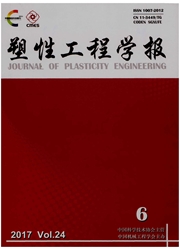

 中文摘要:
中文摘要:
通过热氢处理技术在钛合金中引入临时元素氢,可以改变钛合金的相组成,进而改变钛合金的力学性能和加工性能。文章采用压缩实验研究置氢对TB8合金室温压缩性能的影响,并利用OM、XRD和DTA等方法研究固态置氢后TB8钛合金微观组织和相变的演变过程。结果表明,氢降低了TB8合金的β相转变温度,在氢含量为0.7wt%时组织完全转变成β相,置氢后合金中生成了δ氢化物和ω相;氢对TB8合金的塑性影响较小,但由于β相的软化作用,使置氢后合金的屈服强度低于原始合金,应变硬化能力随氢含量的增加而逐渐增强,主要是由氢原子及氢化物对位错的阻碍作用所致。
 英文摘要:
英文摘要:
Hydrogen is usually used as a temporary component to adjust the mechanical and processing properties of titanium alloys through modifying the microstructure. The effect of hydrogenation on the room temperature compression properties was studied with compression test, and the microstructure evolution and phase transformation of TB8 titanium alloy after hydrogenation were investigated using OM, XRD and DTA. The results revealed that hydrogen reduced β transus temperature, the structure was completely transformed into β phase when hydrogen content reached 0.7wt%, and δ hydride and ω phase appeared in specimens after hydrogenation, Hydrogen had a relatively small impact on plasticity of TB8 alloy. However, due to the softening effect of the β phase, the yield strength after hydrogenation was lower than the original alloy. Strain hardening capacity gradually increased with the increasing of hydrogen content, mainly because the hydrogen atoms and hydrides hindered dislocation motion.
 同期刊论文项目
同期刊论文项目
 同项目期刊论文
同项目期刊论文
 期刊信息
期刊信息
